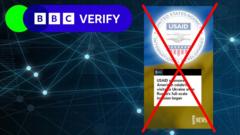In a recent social media surge, a video falsely claims that the United States Agency for International Development (USAID) has disbursed millions to Hollywood celebrities to visit Ukraine. This baseless narrative has gained popularity, being shared and amplified by notable figures, including Elon Musk. However, the clip is misleading and exhibits characteristics typical of Russian disinformation strategies previously flagged by credible sources like the BBC.
BBC's investigative team, represented by journalist Olga Robinson, has highlighted the video’s fabrications and emphasized the importance of scrutinizing claims made on social platforms. The detective work reveals how such content can dangerously shape public perception and spread falsehoods about significant geopolitical matters.
As audiences are continuously bombarded with information, discerning facts from misinformation becomes increasingly crucial. This incident serves as a stark reminder for consumers of digital content to approach sensational claims with skepticism and to seek reliable sources for verification.
In an age where the lines between fact and fiction can blur with a click, accountability in the dissemination of information is paramount to fostering informed, sustainable discussions about global issues like the conflict in Ukraine.
BBC's investigative team, represented by journalist Olga Robinson, has highlighted the video’s fabrications and emphasized the importance of scrutinizing claims made on social platforms. The detective work reveals how such content can dangerously shape public perception and spread falsehoods about significant geopolitical matters.
As audiences are continuously bombarded with information, discerning facts from misinformation becomes increasingly crucial. This incident serves as a stark reminder for consumers of digital content to approach sensational claims with skepticism and to seek reliable sources for verification.
In an age where the lines between fact and fiction can blur with a click, accountability in the dissemination of information is paramount to fostering informed, sustainable discussions about global issues like the conflict in Ukraine.















